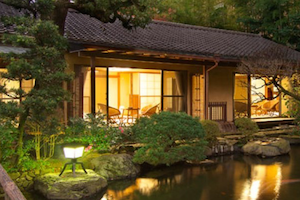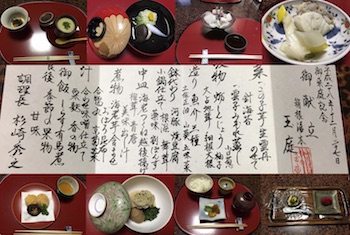Rude tourists in Japan
 Last December, I brought an American friend of mine to a hot spring. We decided to go for a luxury experience and went to a high end ryokan, a Japanese-style inn.
Last December, I brought an American friend of mine to a hot spring. We decided to go for a luxury experience and went to a high end ryokan, a Japanese-style inn.
Here, you get to enjoy amazing food and hot springs experience in a wonderful atmosphere: a tourist magnet. Dinners at a high end ryokan are a relaxed, luxurious affair, where several different courses are brought to your room one by one, giving you the opportunity to savor and appreciate each dish fully and in peace.
The place where we stayed served 8 dishes and the full course took up to two and a half hours to complete. And since each plate has to be brought in the right temperature at the right timing to each room, every movement of staffs working at the ryokan is highly choreographed to make this happen. We do not have the freedom to chose when to start dinner. Only two options: 18:00 or 18:30. We chose the latter.
 Over an hour into our wonderful dinner, the staff brought us the next dish and profusely apologized for bringing our dishes late (I didn’t notice the lateness).
Over an hour into our wonderful dinner, the staff brought us the next dish and profusely apologized for bringing our dishes late (I didn’t notice the lateness).
It seemed like a group of Asian visitors who arrived to the ryokan way passed the dinner start time checked in and, blissfully unaware of how things worked, demanded her, the ryokan staff, to bring all the food out at once. Surely enough, in spite of the look of sheer horror painted upon her face, the she proceeded to get all courses out to the room table in one go, which created a chaos inside the ryokan which the flow of serving to the other 7 rooms on time was endangered.
Can you see what happened here?
This will make it clearer: the other morning I was watching a news show on tv where the main hosts described in disbelief how a bunch of westerners sat for hours at one of the many pop up bars dotting the nation during cherry blossom season, sharing one measly drink while enjoying the beautiful scenery.
Unacceptable, because when it’s cherry blossom season and get a drink at a pop up bar you sit, enjoy your drink and, once you finish, you leave your spot to someone else.
That’s the way it works, just as you wait for each course to come out in its own time at a ryokan. It’s simple, it’s tradition, it’s efficient. And it has to be respected: we work hard to make our society, down to the way we enjoy our spare time, efficient and every single thing affecting this balance disturbs us profoundly.
This is OK. What I find not OK is that we never point it out when this happens. If this happened in the U.S., someone would quite simply state such behaviors are not usual, then proceed to explain how to act properly. Not in Japan, though: here, everyone should know how to behave. In a way, we just expect visitors to learn about our cultural rules and quirks before coming over, so that we don’t have to face the embarrassment of having to tell us ourselves directly. Pointing out a mistake, or even voicing an opposing opinion is a cultural no-no in Japan: people are not used to do it, in fact, they don’t even know how.
This “rude tourist” issue is a growing problem for a country that saw a 200% increase in the number of tourists (24 million in 2016) over the past four years and expects numbers to reach 40 million for the 2020 Tokyo Olympics. But what do we do to solve the problem? We just bad mouth “rude tourists” solely within the Japanese community, never giving them the opportunity to actually learn about our culture by letting them know how things work in the country.
I find hilarious, because visitors usually love learning about local traditions, heritage and habits, so there’d be good chances they’d appreciate the chat! It’s a lose-lose situation but it happens all the time, it’s full on ambivalence: we want more tourists to come, we’d like them to act according to our own standards and habits, yet we refuse to directly explain them how.
So how do you know you’re not violating our cultural norms? I don’t have an answer to this and I’d love to hear your take on it. One solution I can think of, in case you sense something may be wrong through people’s body language or any other sign (please note that this will be extremely subtle to detect), is to just ASK. We Japanese are naturally kind and usually very pleased when people show interest in our traditions, so when something looks off to you, ask us why and you’ll learn a bunch.
I find this is a win-win situation because we Japanese will start developing our explanation skills and you’ll learn more about the country you’re visiting. In the end, what’s not to like in learning about another culture and having people interested in yours?

